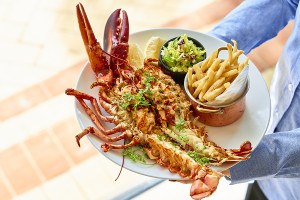Flaming Powders and Booze-Soaked Pineapple: What You Missed at Grant Achatz's Harvard Lecture
Last night Chicago-based superchef Grant Achatz was the latest to take the stage at the Harvard Science Center as part of their Science and Food lecture series. While his talk last year focused namely on his fine-dining destination Alinea, this time around he centered his talk on his new avant-garde cocktail bar, The Aviary (you can familiarize yourself with this cool video). Before his lecture, we chatted with Achatz to find out his approach this year. “I just feel like everyone was doing food, and frankly because cocktails have been largely untouched by progressive technique and creative thinking,” Achatz said of his decision to go the cocktail route with his talk. “I just thought it would be a good topic to explore, something that’s more new and fresh.”
As for the question on everyone’s minds—where did he eat when he was through? He told us that he was planning on visiting Bondir and Eastern Standard last night, while tonight the plan is to go to B&G Oysters and Drink. We also learned that he stopped by Harvest for a midday mushroom-topped burger yesterday afternoon.
If you missed the talk, fear not—below, find our main takeaway from the lecture, and check out our slide show from the event above.
Rejected proposals can still be fruitful.
The idea for The Aviary came after Achatz and his team was approached by a hotel opening in Chicago for a bar/restaurant concept. While they turned down the proposal, it got them thinking about what type of bar they’d create if they were to have gone forward with it. Then came the realization that they could still do things their way. “There’s no reason we can’t utilize everything we’ve used in gastronomy and apply it to the liquid world,” Achatz said.
It’s possible to run a bar without, well, a bar.
While The Aviary serves cocktails, it’s actually a cocktail restaurant, technically, and not a bar. As such, there are cocktail chefs who work in a kitchen, rather than tend bar. The argument against the concept is that it takes away the bartender-customer relationship, but The Aviary’s head cocktail chef, Craig Schoettler (who also presented at the lecture) says that this gives the chefs less distractions—less time interacting with customers means more time perfecting the drinks.
What the drink is served in is just as important as the drink itself.
Achatz commissioned custom serving pieces for Alinea, and did so as well at The Aviary. This allows the cocktail chefs to more effectively manipulate guests’ consumption of the drinks. A large serving piece called “The Porthole,” for example, which looks like a thin fishbowl with a tiny spout sticking out of the side, allows the various aromatics in the drink to steep, causing the beverage to change in color and flavor as it sits. To prevent guests from drinking the whole thing at once (and therefore eliminating essential steeping time) they are given specially-designed one-ounce glasses to slow the drinking process.
Emotion can be just as integral to the dining experience as taste.
Achatz’s next menu at his restaurant Next will be called Childhood, and is based on the memories of Achatz and Next executive chef Dave Beran, who both grew up in Michigan at around the same time. Achatz showed off a dish he’ll be offering at the restaurant, a play on roasted marshmallows featuring sweet potatoes cooked in blue corn for a blackish, log-type hue, that are then sprinkled with flavored alcoholic tapioca maltodextrin and served to the table flaming. It’s served alongside another dish with housemade marshmallows. It’s meant to evoke powerful memories of the past, something Achatz emphasized as an important element of the dining experience. Achatz also revealed a nice little nugget during the Q&A period: he is in the process of creating an exhibit framed around the emotional experience in a restaurant for the Museum of Contemporary Art in Chicago.
If students want to help Achatz out, there might be a job in it for them.
At the end of the lecture, a student asked Achatz what problems he’d most like solved at The Aviary (bear in mind, Science and Food students have to take on a problem-solving thesis as part of the course). He replied that he’d like to be able to create flavored snow for drinks—real snowflakes, not just crushed up ice, mind you—and would also like to create cocktails that resemble lava lamps. Schoettler also chimed in that he’d love to figure out how to make ice that sinks, so that it doesn’t collide with the diners’ mouth every time they take a sip. “If anyone can make snow, I’ve got a job…” Achatz said.
For more food related coverage, follow us on Twitter at @ChowderBoston.

